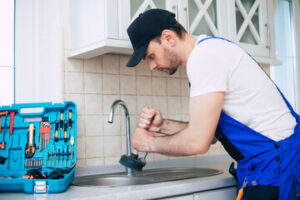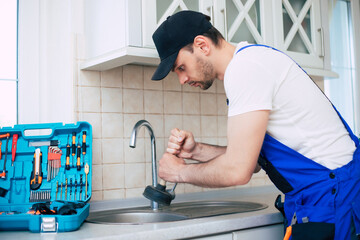Keeping your drains and pipes clean is essential to keeping your home healthy. But using over-the-counter caustic drain cleaners may cause more damage than you think. Professional drain cleaning offers many safe clog removal options that can get even the most stubborn clogs broken down or removed completely. Drain Cleaning Sarasota can also recommend ways to prevent future clogs.
 Clogged drains are one of the most common plumbing problems. When they clog, it can result in messy and smelly wastewater back-ups that are a nightmare to clean up. Kitchen, bathroom, and tub drains see soap scum, food debris, hair, and other drain-clogging materials daily.
Clogged drains are one of the most common plumbing problems. When they clog, it can result in messy and smelly wastewater back-ups that are a nightmare to clean up. Kitchen, bathroom, and tub drains see soap scum, food debris, hair, and other drain-clogging materials daily.
Fortunately, many at-home remedies can help you clear a clogged drain. For example, try pouring a combination of baking soda and vinegar down your drain. This natural remedy works well because baking soda and vinegar react with each other to neutralize the acid in clogs and often dislodge them from pipes. This method is also effective for clearing stubborn bathtub drain clogs.
Other at-home solutions include using a plunger or drain snake to break up and remove the clog. If these methods do not work, it is important to call a professional. Severe clogs, such as those caused by years of accumulated grease buildup or tree roots, require more significant tools to handle than a standard home drain cleaning tool can provide.
One of the most common reasons for a clogged toilet is flushing excessive amounts of toilet paper or objects that don’t belong in the toilet. These include tampons, paper towels, and kids toys. Clogged toilets can also cause sewage backup and other serious issues, so it is important to call a plumber right away if you suspect that your toilet is clogged.
While minor clogs can be cleared with household tools, frequent clogs may indicate that there is a larger problem in your drain line. These clogs can form over months or even years and are usually the result of soap residue, fats, hair, and other organic matter. If they are not addressed, they can cause serious damage to your pipes and affect the flow of water throughout your house.
Most people do not think about their drains on a regular basis because they are out of sight and mind. However, it is important to understand the role that your drains play in your home’s plumbing system and how they can be affected by everyday use and environmental factors.
Clogged toilets can be a huge headache. You can try to clear the drain yourself using a plunger or a toilet auger, but if it’s a recurring issue, you may have to consider calling in a plumber. The good news is that there are things you can do to prevent clogged toilets from happening in the first place.
One of the most common causes of clogged toilets is hair. When this happens, it’s best to use a natural drain cleaner that won’t harm your pipes. This product uses plant-based ingredients and has a B rating from the Environmental Working Group, which is great for those who want to be more environmentally conscious.
Another common cause of clogged toilets is non-flushable items. These include cotton balls, Q-tips and other household waste. It’s important to remind family members what can and cannot be flushed so they don’t accidentally drop foreign objects down the drain. Keeping small trashcans in the bathroom can also help. If you have young children, it’s a good idea to teach them about toilet safety and the importance of not flushing toys down the drain.
A toilet clog can also occur when the toilet trap becomes clogged with a build-up of debris and other materials. You can remove the debris by using a flanged plunger or a toilet auger. A wet/dry vacuum is another option to consider for larger clogs.
If the clog is a result of a large blockage in your home’s sewer line, you may need to call a professional plumber to address it. The good news is that there are solutions like a hydro jetting service that can clean and clear clogged lines without having to dig out the entire pipe.
If you’re experiencing frequent clogged toilets, you can try to avoid them by being more careful about what you put down the drain. You can also have an epoxy lining system installed in your iron plumbing to prevent future clogs.
When you have a clogged shower, it can be frustrating. Not only do you have to deal with standing water in your tub, but the smell from the drain is probably unbearable.
Clogged showers usually happen when hair, lint or soap gunk accumulate over time. There is a wide range of products available to unclog your shower. Some are more hands-on and are more preventative, while others require a drain snake or other tool to reach deeper down the pipe and dislodge larger chunks of clog.
Before reaching for harsh chemicals, try these easy at-home methods. Whether you have long or short hair, it’s a good idea to comb and transfer loose hairs into the wastebasket before showering. You should also clean the drain and showerhead with safe household cleaners to remove soap scum and residue. It’s also a good idea to pour a cup of baking soda and vinegar down your shower drain once a month to create a chemical reaction that breaks apart hairs and other grime.
If these methods don’t work, you can use a store-bought drain cleaner ($7, Target) to dissolve a hair clog. Make sure to follow the directions on the label and wear gloves when using these chemicals. Also, remember that these drain cleaners are dangerous to inhale and can corrode your pipes, so they should be used sparingly.
Another option is to try plunging. This is especially helpful for surface-level clogs like hairs or lint that have collected on the sides of your shower drain. But don’t plunge if you have used any type of chemical solution in your shower drain within the past day or two. This could cause the water and chemicals to splash back up on you, causing injury or even burns.
Lastly, you can always try running a snake down your shower drain. Be careful not to touch the coil and keep your fingers away from the nozzle when winding the snake. This can be a messy job and might take a while to break up a larger clog. Be sure to check the condition of your pipes afterward and call a professional if you notice any damage.
Clogged sinks are usually caused by food waste, hair and other objects that shouldn’t have been put down the drain. These clogs can lead to overflow and a potential health risk. It is important to clean these clogs as soon as possible. You can use various home remedies or call a professional to get rid of them.
When your sink drain is clogged, you can try using a plunger to dislodge the build-up of materials. However, make sure you have a sink plunger and not a toilet plunger as the size of the opening is different. You can also mix a solution of one cup of vinegar with hot water and pour it down the drain. The acid in the vinegar breaks down soap scum and other organic materials.
You can also try squirting grease-fighting dish soap down the drain followed by boiling water. This will melt the gunk and help break up a grease clog. You can also try a zip-type clog remover that is sold at most hardware stores. This uses a small flexible rod that can fit into the p-trap under most sinks. However, if none of these methods work, it is time to call in a plumber.
Your plumbing pipes are a vital part of your home’s infrastructure, carrying freshwater in and waste water out. If these pipes become blocked, it can cause major problems that can be expensive to fix. The best way to prevent a clogged pipe is by using proper plumbing practices and regularly cleaning your pipes.
It’s understandable why you don’t think about your plumbing and drains much – after all, you’re busy trying to juggle the demands of work, family and life in general. But if your drains or pipes become clogged, it can cause major headaches and stress.
There are several ways to clean a clogged drain, including using natural household products and mechanical methods (plunging and snaking). Avoid chemical cleaners as they can damage your pipes and are toxic to you and your family. If you still have a clogged drain, try these tips to clear it as quickly and safely as possible.

